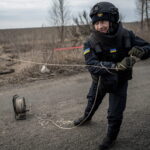As U.S. and European elections approach, concerns about a frozen Ukraine conflict are spreading. They are fueled partly by Putin’s disingenuous and self-serving peace entreaties. A frozen conflict at existing battle lines would only solidify Russian gains. Consequently, a frozen conflict represents a Russian victory with an invitation to regroup and reinvade additional Ukraine territory. Russia has followed this playbook since 2014, and allowing it to annex Ukraine in stages will only encourage the behavior.
It is important to note that the United States and Europe have, in their considerable support of Ukraine, prevented a swift Russian annexation while severely handicapping Ukrainian counterstrike capabilities by restricting the types of weapons provided in aid packages and limiting the extent of their use. Consequently, the absence of a clear commitment to victory will ensure a frozen conflict. In a war against evil, there is no substitute for victory—for no peace will come but through strength. Proponents of frozen conflict, in effect, are calling for a long-simmering one.”
Any forced cessation of hostilities would be a chimera. Hostilities would surely continue unofficially with reduced command and control and, thus, greater chaos and unpredictability. Serious consideration of the much-needed armistice should be preceded by meeting three conditions to secure regional peace and stability.
Efforts to pressure Ukraine to a premature cessation of war should weigh its probable near and mid-term consequences. There are two major ramifications to consider in the case of a forced frozen conflict. First, the impact on Ukraine’s polity, and second, the regional impact across the Black Sea and southeastern Europe. There is a high probability that a forced armistice will result in significant national turmoil across Ukraine, including a putative civil war not unlike the “Irish Troubles.” More than a million highly trained and armed Ukrainian citizens and their families are likely to view a forced armistice as a betrayal of their service and sacrifice. If this division develops into anything like the Irish Troubles—an ultra-nationalist, anti-Russia, anti-West Ukraine would represent a severely unstable force affecting all its neighbors and the region.
The regional impact of a cessation of hostilities with existing Russian gains would have an extraordinarily destabilizing impact across the Black Sea and southeastern Europe. Russia has made substantial gains in stages along the Black Sea coast from illegally annexing South Ossetia in 2008 and Crimea in 2014, and since 2022, it has made substantial gains westwards. Each frozen conflict has resulted in further advances along the Black Sea towards the Danube Delta. Another pause, cementing Russian gains, would likely encourage its ambition to annex the entire Ukraine coast and the Republic of Moldova up to Romania.
Russian control of the Ukrainian coast would alter the Black Sea from a free and open space, connecting Europe with the Caucasus and Central Asia, to a sea of tumult contested by Europe/NATO and Russia. It will turn the Black Sea from an engine of prosperity and stability in the region to an ulcer of instability and a barrier to transcontinental commerce. It would lead to increased Russian meddling with enhanced cyber-attacks, disinformation campaigns, political pressure, and other hybrid tools across Europe, especially in southeastern Europe and the eastern Mediterranean. Russia’s provocative and persistent probing along NATO’s southeastern front will increase to disable the Danube as an effective European gateway to the Black Sea. Importantly, Russian annexation of the Black Sea paves the way for greater reach in the region—and across to the eastern Mediterranean—for China and Iran.
Any discussions that hope to produce an effective and sustained armistice should not compromise upon the following three essential characteristics. First, Ukraine must have a time-bound accession to the European Union. Ukraine brings significant assets to the European project—as it is an agricultural, digital, and industrial powerhouse. Secondly, there must be a time-bound Ukrainian accession to NATO. NATO, including its new members, Finland and Sweden, would be substantially strengthened by having Ukraine as one of its frontline members. On day one, the alliance would benefit from a battle-tested military that, through sheer grit and ingenuity, has held at bay the might of Russian forces three times its size—for three years.
The alliance would also benefit from Ukraine’s hard-earned familiarity with Russian tactics. Ukraine’s substantial munitions manufacturing capabilities and the longest coastline adjoining the Black Sea would be equally advantageous to NATO. Ukraine, of course, bears the responsibility to ensure it undertakes all practicable governance reforms to qualify for EU and NATO membership. Third, all efforts should be made to free Crimea from Russian control. Russian-occupied Crimea represents a malign wellspring of coercion and instability across the entire Black Sea region. With Crimea under Russian control, the Black Sea will never be entirely free and open and will stand in the way of regional peace and prosperity.
The United States and all free nations should be committed to bringing the Russian war in Ukraine to a conclusion as soon as possible to prevent any further loss of life. However, this goal needs to be achieved in a way that ensures Ukrainian freedom and security, as well as sustains the desired state of peace—and does not make matters worse. The negative consequences of a hasty armistice deserve sober consideration. Perhaps the most important consideration is whether or not an armistice will result in lasting peace and deter further Russian aggression or annexation. Any armistice with a credible deterrence against further Russian imperialist operations in the region should be heartily welcomed. Anything short of such a strong deterrent would be immoral, imprudent, impractical, and short-lived.
Kaush Arha is president of the Free & Open Indo-Pacific Forum and a nonresident senior fellow at the Atlantic Council and the Krach Institute for Tech Diplomacy at Purdue.
George Scutaru is the CEO of the New Strategy Center and a former national security advisor to the President of Romania.
Image: Drop of Light / Shutterstock.com.
Source: nationalinterest.org







